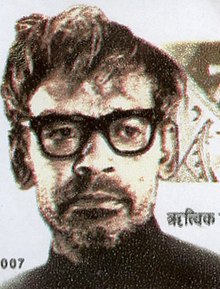Ritwik Ghatak | |
|---|---|
 | |
| Born | Ritwik Kumar Ghatak 4 November 1925 |
| Died | 6 February 1976 (aged 50) |
| Education | Ballygunge Government High School, Rajshahi Collegiate School |
| Alma mater | Presidency College, Calcutta University |
| Occupations |
|
| Years active | 1952–1976 |
| Works | |
| Spouse | Surama Ghatak[1] |
| Children | 3[2] |
| Relatives | Aroma Dutta (niece) Manish Ghatak (brother) Mahasweta Devi (niece) Parambrata Chatterjee (grandnephew) Nabarun Bhattacharya (brother's grandson) Bijon Bhattacharya (niece's spouse) |
| Awards | Padma Shri (1970) National Film Award for Best Story (1974) |
Ritwik Kumar Ghatak (; 4 November 1925 – 6 February 1976)[3] was an Indian film director, screenwriter, actor and playwright.[4] Along with prominent contemporary Bengali filmmakers like Satyajit Ray, Tapan Sinha and Mrinal Sen, his cinema is primarily remembered for its meticulous depiction of social reality, partition and feminism. He won the National Film Award's Rajat Kamal Award for Best Story in 1974 for his Jukti Takko Aar Gappo[5] and Best Director's Award from Bangladesh Cine Journalist's Association for Titash Ekti Nadir Naam. The Government of India honoured him with the Padma Shri for Arts in 1970.[6][7]
- ^ Cite error: The named reference
toi17Nov2009was invoked but never defined (see the help page). - ^ Partha Chatterjee (19 October 2007). "Jinxed legacy". Frontline. Archived from the original on 2 May 2008. Retrieved 4 November 2012.
- ^ Carrigy, Megan (December 2003). "Ritwik Ghatak – Great Director Profile". Senses of Cinema. ISSN 1443-4059. Archived from the original on 29 July 2012. Retrieved 24 June 2012.
- ^ "Ritwik Ghatak s Lesser Known Prowess of Writing Plays". The Wire. Archived from the original on 6 August 2020. Retrieved 22 July 2020.
- ^ "Na22nd National Film Awards" (PDF). Iffi.nic.in. Archived from the original (PDF) on 28 September 2011. Retrieved 30 July 2012.
- ^ "Padma Awards Directory (1954–2014)" (PDF). Ministry of Home Affairs (India). 21 May 2014. p. 39. Archived from the original (PDF) on 14 September 2017. Retrieved 22 January 2019.
- ^ "Controversy". Ramachandraguha.in. Archived from the original on 2 June 2019. Retrieved 30 July 2012.